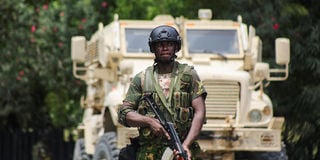
A Kenyan police officer walks in front of an armoured personnel carrier during a joint operation with Haitian police, in Port-au-Prince, Haiti July 29, 2024.
Kenya on Wednesday, November 21, pitched for a change of mandate of the Multinational Security Support Mission to Haiti (MSS) into a fulltime peacekeeping mission, to a reluctant UN Security Council keen to avoid mistakes of the past.
At the briefing on Wednesday evening, Kenya’s National Security Adviser Monica Juma argued the MSS has already achieved some success, with limited resources, and told the Council it can reach more if it gains sufficient, predictable funding.
“The circumstances that face Haiti today, if facing any country today, will be facing the tragedy that we are seeing in Haiti today.
“This Council, based on its mandate, has the capacity to help restore peace and stability in Haiti today. This situation requires a sustained, well-enabled peace operation,” she said.
Earlier, she had indicated the MSS had helped return the functionality of government services and allow humanitarian access where the police troops were deployed.
The proposal was drafted by the US and Ecuador, known as Haiti’s penholders on the Council, although the meeting was called by Russia and China.
China’s representative at the session argued conversion of the MSS to a peacekeeping mission would endanger the troops as the local political situation is still volatile.
He argued such a conversion would work only if all political factions “demonstrate political will and work together for the stability and development of their country.”
For the US, which has backed the conversion to a full peacekeeping mission, it is the best way to go.
“This would facilitate the MSS mission, and the countries supporting it, to take advantage of existing UN financial, personnel, and logistical support structures as well as predictable and sustainable financing,” said the US statement at the Council.
Kenya, which is leading the MSS had argued for a change of mandate to guarantee sufficient funding for its operations.
Dr Juma argued the adjustment is necessary to ensure the mission draws from the UN kitty, rather than rely on irregular donations from member states.
However, opposition from Russia and China, which have previously rejected such proposals on the grounds that the security situation in Haiti is not conducive to peacekeeping, means that a resolution could be vetoed in the future. Jamaica, Canada, the Dominican Republic, Mexico and Brazil supported Kenya's call.
The UN itself had argued that Haiti's growing gang violence required a well-equipped mission with specialised police officers who could use "robust force" to tame the gangs.
But Miroslav Jenča, the assistant secretary-general for Europe, Central Asia and the Americas, suggested that the MSS mandate would be sufficient if donors came through.
“What is required,” he argued, “is a sizable increase in internationally provided enhanced security support that complements the Haitian National Police.”
“This support must include adequate capabilities, weapons, equipment, and specialised expertise that the Haitian National Police needs in order to remain the primary actor in the response to armed gangs.
“A robust mandate, already authorised for the MSS, coupled with Rules of Engagement allowing proactive engagements against armed gangs, is essential.”
The MSS was first endorsed in October 2023 and was due to report in February before that as delayed to June this year owing to financial constraints and political problems in Haiti.
Kenya would later send 400 police officers and has pledged another 600 before January. The entire MSS could rise to 2500 troops if other countries send as pledged. But it has faced financial constraints and equipment shortfalls which has meant the forces cannot tackle the expansive gangs.
China and Russia have argued turning the MSS into a peacekeeping mission will limit its ability to use force and protect civilians, given they will operate under different rules.
The US had pledged $300 million but only sent $100 million. The balance has to be approved by Congress. Yet an imminent change of administration from Joe Biden to Donald Trump could create uncertainty.
Last week, however, Kenya’s calls garnered more support after 34 countries belonging to the main Americas bloc endorsed the move.
The 34 countries belonging to the Organization of American States (OAS) approved a request by the Haiti Transitional Presidential Council to convert the peacekeeping mission in Haiti into a United Nations Peacekeeping Operation.
The organisation is made up of countries from Central and South America.
“To encourage support for the Haitian Transitional Presidential Council’s request to transition and the MSS mission into a UNPKO in order to provide more sustainable support for Haiti’s long-term stability, security, rule of law, and democratic governance,” read the resolution.
Haiti has seen a rise in gang violence that forced the UN and the US to suspend flight operations to Porto-Au-Prince.
As it is, the MSS is endorsed by the UN and operates under the normal rules of peacekeeping. But it draws funding from voluntary contributions from member states. The US, Canada, France and the UK have been the foremost backers of the MSS.
The proposal to convert it into a peacekeeping mission will require the approval of the UN Security Council, including all the P5 comprised of the US, UK, France, China and Russia. The Council had rejected the suggestion before, given the way previous peacekeeping missions in Haiti underperformed.
In September, the Council unanimously extended its mandate by a year.



